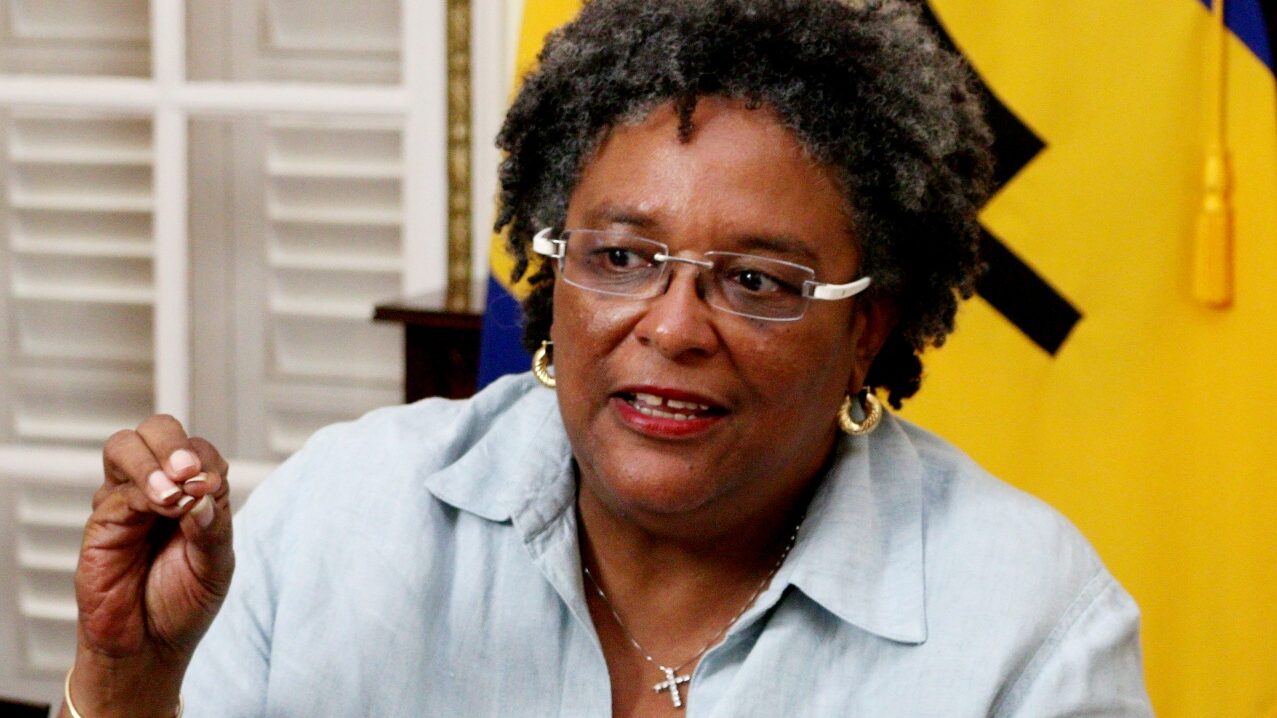Barbados Prime Minister Announces Rescue Plan for Fishing Industry After Hurricane Damage

July 6, 2024
Prime Minister Mia Mottley unveils a rescue plan for Barbados' fishing industry post-Hurricane Beryl, including funding measures, a Benevolent Fund, and Business Interruption Benefit extension for fisherfolk.
A comprehensive rescue plan to restore the fishing industry and rebuild coastal defences has been announced by Prime Minister Mia Mottley in response to the unprecedented wave damage caused by Hurricane Beryl on Monday.
A series of short, medium and long-term funding measures, including an immediate gift of $500 000 from the Development Bank of Latin America and the Caribbean (CAF) to capitalise a new Benevolent Fund for Fisherfolk, were disclosed during a press briefing at Ilaro Court on Friday.
“The Government of Barbados has received a humanitarian donation from the Latin American Development Bank . . . of US$250 000 (BDS$500 000). I have said to the Director of Finance and Economic Affairs that must go fully and straight – the full amount – to capitalise the first donation to the Benevolent Fund for Fisherfolk in the country,” Mottley said.
The government will also extend its Business Interruption Benefit, introduced during the COVID-19 pandemic, to all affected fisherfolk, regardless of their National Insurance contribution status, Mottley.
“All will be entitled to receive the Business Interruption Benefit over the next few months, ’til we can get the industry back on its feet,” she said.
A 30-year revolving fund is also to be established to help fishermen finance new boats, with the government offering grants of up to 25 per cent of the cost for new boats or repairs.
The announcements came as new details emerged of the historic extent of damage to the coastline. Hurricane Beryl’s eight-feet storm surges breached the sea defences of the Bridgetown Port and the Bridgetown Fisheries Complex, sinking scores of fishing boats and pleasure cruisers, including the famed Jolly Roger.
The prime minister rejected claims by Opposition Leader Ralph Thorne that the government is legally liable for the damage caused to the fishing vessels, contending that in law, no one can be held responsible for damage, loss or hurt if such is caused by a natural disaster. She referred to the principle of “force majeure” where no party can be held at fault during uncomfortable events such as war, labour stoppages or extreme weather.
Mottley also reported that the damage to beaches is particularly severe in some areas. She described Thunder Bay in Lower Carlton, St James as having “a six-foot drop”, demonstrating the extent of erosion caused by the hurricane.
The PM emphasised the importance of beach vegetation in preventing erosion, noting that areas with established root systems showed less damage than exposed beaches: “It shows you the wisdom of us putting the vegetation on the beaches, because you can see the roots of the trees effectively holding the sand together; and beyond the roots, you are not seeing the level of erosion that you would otherwise see.”
To address these coastal challenges, the government’s “coherent approach” will cover the entire coastline from St Lucy in the north to the Bridgetown Port in the southwest. This strategy will involve a new executing unit dedicated to beach maintenance and coastal protection.
“We believe that in the same way we have a unit to come to work every day to take care of the roads in MTW, we must have a unit that comes to work every day to take care of the beaches,” Mottley explained.
“The Coastal Zone Management Unit that has been in existence for over 40 years, is fundamentally about engineering advice and regulatory role. But we need an executing unit now that allows us to take care of these beaches on an ongoing basis, and to work with the requisite professional services that would allow us to have the advice as to how and where you nourish beaches, where you have to put sea walls, where you have groynes, [and] where you have offshore underwater breakwater.”
Coastal engineers have reported that Hurricane Beryl was more severe than a one-in-a-hundred-year event, with storm surges displacing five-tonne concrete blocks “as if they were balls”, said Mottley. The coastal engineers’ assessment that future structures may require concrete blocks weighing at least 15 tonnes, up from the current five tonnes, underscores the scale of adaptation required.
The Bridgetown Port’s breakwater also suffered considerable damage, leading to the sinking of two party boats. Mottley indicated that planned improvements to the breakwater would now need to be brought forward.
“Those waves made that breakwater look like child’s play and it led to the sinking of the Jolly Roger and the Dream Chaser,” she said.
The PM also addressed the damage to the Bridgetown Fisheries Complex, emphasising the need for more robust coastal defences in light of the changing climate.
The government has already instructed repairs to begin on the public and private jetties at Oistins, Christ Church.
The tourism industry has been significantly affected, with 73 per cent of hotels, apartments and guest houses reporting some level of damage, according to the Barbados Hotel and Tourism Association. However, damage to the pleasure cruise sector has been limited.
In agriculture, 35 acres of banana farms were lost, though the sector was mostly unscathed, and Mottley said the Ministry of Agriculture is addressing the situation.
The housing sector reported minimal damage, with Ministry of Housing assessments underway to support affected residents.
Despite the extensive damage, the prime minister expressed gratitude that no lives were lost during the hurricane.
“The fact, however, that we have saved lives and that there is no one who has died in Barbados as a result of Hurricane Beryl, is a matter for which we will give thanks,” Mottley said.
emmanueljoseph@barbadostoday.bb


